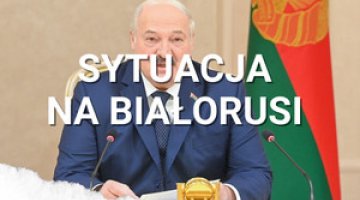Social discontent rising in Belarus: a threat to the regime?
On 20 July, silent opposition protests against government policy, including its unsuccessful fight against the economic crisis, were held in Minsk and the regions of Belarus for the ninth consecutive week. The protests resemble flash mobs (involving the creation of an artificial crowd in a public place) and are being organised through online social networking sites, under the slogan ‘Revolution via social networks’. The use of new forms of opposition is a sign of growing public dissatisfaction with the policies of President Alyaksandr Lukashenka, who is increasingly often being blamed for the economic crisis and the decline in living standards. Although the protest activities currently include only small numbers of people, it is possible that in autumn, when residents return to town after the holidays, and living costs rise significantly, further demonstrations may accumulate more and more participants, and will be held under the banners of specific political and economic changes. The most important result of the current protests is the growing empowerment of the Belarusian society, which as yet was not ready to speak out publicly in defence of its interests, outside the circles of opposition supporters and narrow occupational groups. This trend may also be exploited by some of the Belarusian nomenklatura to achieve greater independence from Alyaksandr Lukashenka, and if worst comes to worst, perhaps to remove him from power. The rising social tension combined with the related activity of the nomenklatura are opening up new room for manoeuvre for external actors – primarily Russia, which has long been striving to increase its control over Belarus.
Fall in living standards
The growing crisis in the Belarusian economy is increasingly being translated into a decline in living standards. According to official data from the first half of this year, inflation was running at over 40%, the highest level in ten years. According to independent Belarusian economists, the annual increase in inflation may even exceed 50%. As a result, the purchasing power of the Belarusian rouble, also in relation to essential goods such as potatoes, cabbage, sugar and rice, is declining. On average Belarusians spend about 40% of their income on food, which is one of the highest rates in Europe. There remains a serious shortage of foreign currencies, which prevents individuals from investing their savings securely and limits the operation of many businesses. At the same time, despite the significant price rises, there are problems keeping shops supplied, reflecting the continuing phenomenon of certain goods being hoarded.
The likelihood of mass layoffs in the coming months is growing, especially in the private sector. It is difficult to estimate the scale of this phenomenon; official statistics show only 0.7% of the working population is unemployed. Moreover, the authorities have announced a rise in municipal charges by the end of this year, of which the state has so far covered over 70%. This situation is already having a negative effect on public sentiment. In a June survey by the Belarusian independent public opinion research centre NISEPI, 44% of respondents blamed President Lukashenka for the crisis, and only 29% expressed a willingness to support the current president in elections, his worst result since the spring of 2003.
Manifestations of social discontent, and the authorities’ response
Since June, regular weekly demonstrations called ‘flash mobs’ have been held in Belarus, organised by online social networking sites. Participants meet at a designated time and place in Belarusian city centres, and express their dissatisfaction with government policy by simply applauding, without using any particular symbols or political slogans. In a similar way, drivers unhappy at rising petrol prices have been organising themselves; their form of protest involves bringing traffic to a halt. These protests are characterised by their variable dynamics, and any number from several dozen to several thousand participants may be involved. These are the first signs of a growing social discontent extending beyond the wider social environment than the current political opposition or certain professional groups (such as market traders). This illustrates the breakdown of the barriers of fear which Belarusians have characteristically felt for expressing protest in public. In addition, street demonstrations have successfully been organised over the Internet for the first time in Belarus, a technique already familiar in other countries. And although in recent weeks the flash mobs have been declining in number, it seems that this is primarily a result of the holiday period and the decisive action taken by the authorities, rather than any improvement in public sentiment.
The government’s behaviour is of key importance for the dynamics of these demonstrations. Initially, authorities seemed taken aback by the new form of protest. However, during subsequent demonstrations they have undertaken pacification actions, consisting primarily of catching people suspected of participating in the protests. At the same time, this has led to the detention of random passers-by, the elderly and the disabled, which has caused additional public outrage. Some detainees were convicted and sentenced to jail for 15 days, a tactic aimed at discouraging people from participating in future actions. Meanwhile, the Belarusian special services have made attempts to block the functioning of those internet groups where the protests are being organised.
Forecast
These weeks-long demonstrations mark the beginning of changes in Belarusian society. So far the Belarusian public have avoided any public expression of opposition, but they are gradually breaking down the barriers of fear, due to their deteriorating living standards. The regime no longer guarantees their social security, which until now had been one of the pillars of the authoritarian system of Alyaksandr Lukashenka’s government. So the expected further rises in the cost of living this autumn may lead to demonstrations larger than the current ones. This possible social destabilisation in Belarus provides room for manoeuvre for the Belarusian nomenklatura, which could then try to take the fight for greater autonomy to Lukashenka himself, primarily by obtaining permission to purchase state assets. In extreme cases, attempts to force the Belarusian president from power cannot be ruled out.
At the same time Russia could have an important role to play; as a supplier of energy resources and currently Belarus’s only creditor, it has been a key external player in this country. The Kremlin sees Minsk’s difficult economic situation as an opportunity to increase its influence, primarily through the strategic acquisition of Belarusian enterprises (including its gas pipeline network, its car manufacturers and its potassium company). Therefore, any mass social unrest and related attempts by the nomenklatura to become independent may induce Russia to take advantage of the situation.
Fall in living standards
The growing crisis in the Belarusian economy is increasingly being translated into a decline in living standards. According to official data from the first half of this year, inflation was running at over 40%, the highest level in ten years. According to independent Belarusian economists, the annual increase in inflation may even exceed 50%. As a result, the purchasing power of the Belarusian rouble, also in relation to essential goods such as potatoes, cabbage, sugar and rice, is declining. On average Belarusians spend about 40% of their income on food, which is one of the highest rates in Europe. There remains a serious shortage of foreign currencies, which prevents individuals from investing their savings securely and limits the operation of many businesses. At the same time, despite the significant price rises, there are problems keeping shops supplied, reflecting the continuing phenomenon of certain goods being hoarded.
The likelihood of mass layoffs in the coming months is growing, especially in the private sector. It is difficult to estimate the scale of this phenomenon; official statistics show only 0.7% of the working population is unemployed. Moreover, the authorities have announced a rise in municipal charges by the end of this year, of which the state has so far covered over 70%. This situation is already having a negative effect on public sentiment. In a June survey by the Belarusian independent public opinion research centre NISEPI, 44% of respondents blamed President Lukashenka for the crisis, and only 29% expressed a willingness to support the current president in elections, his worst result since the spring of 2003.
Manifestations of social discontent, and the authorities’ response
Since June, regular weekly demonstrations called ‘flash mobs’ have been held in Belarus, organised by online social networking sites. Participants meet at a designated time and place in Belarusian city centres, and express their dissatisfaction with government policy by simply applauding, without using any particular symbols or political slogans. In a similar way, drivers unhappy at rising petrol prices have been organising themselves; their form of protest involves bringing traffic to a halt. These protests are characterised by their variable dynamics, and any number from several dozen to several thousand participants may be involved. These are the first signs of a growing social discontent extending beyond the wider social environment than the current political opposition or certain professional groups (such as market traders). This illustrates the breakdown of the barriers of fear which Belarusians have characteristically felt for expressing protest in public. In addition, street demonstrations have successfully been organised over the Internet for the first time in Belarus, a technique already familiar in other countries. And although in recent weeks the flash mobs have been declining in number, it seems that this is primarily a result of the holiday period and the decisive action taken by the authorities, rather than any improvement in public sentiment.
The government’s behaviour is of key importance for the dynamics of these demonstrations. Initially, authorities seemed taken aback by the new form of protest. However, during subsequent demonstrations they have undertaken pacification actions, consisting primarily of catching people suspected of participating in the protests. At the same time, this has led to the detention of random passers-by, the elderly and the disabled, which has caused additional public outrage. Some detainees were convicted and sentenced to jail for 15 days, a tactic aimed at discouraging people from participating in future actions. Meanwhile, the Belarusian special services have made attempts to block the functioning of those internet groups where the protests are being organised.
Forecast
These weeks-long demonstrations mark the beginning of changes in Belarusian society. So far the Belarusian public have avoided any public expression of opposition, but they are gradually breaking down the barriers of fear, due to their deteriorating living standards. The regime no longer guarantees their social security, which until now had been one of the pillars of the authoritarian system of Alyaksandr Lukashenka’s government. So the expected further rises in the cost of living this autumn may lead to demonstrations larger than the current ones. This possible social destabilisation in Belarus provides room for manoeuvre for the Belarusian nomenklatura, which could then try to take the fight for greater autonomy to Lukashenka himself, primarily by obtaining permission to purchase state assets. In extreme cases, attempts to force the Belarusian president from power cannot be ruled out.
At the same time Russia could have an important role to play; as a supplier of energy resources and currently Belarus’s only creditor, it has been a key external player in this country. The Kremlin sees Minsk’s difficult economic situation as an opportunity to increase its influence, primarily through the strategic acquisition of Belarusian enterprises (including its gas pipeline network, its car manufacturers and its potassium company). Therefore, any mass social unrest and related attempts by the nomenklatura to become independent may induce Russia to take advantage of the situation.





